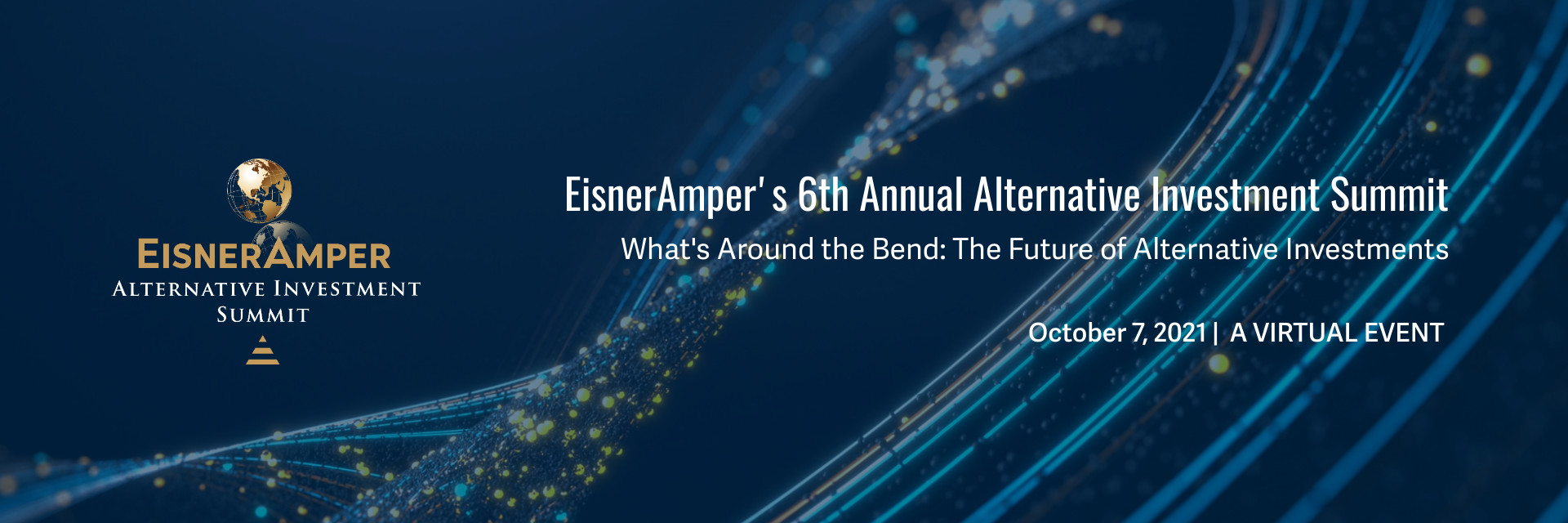
A New Era for Private Equity and Venture Capital
- Published
- Oct 15, 2021
- Share
Over the last year plus private equity firms have taken steps to integrate both environmental, social and governance (ESG) and diversity, equity and inclusion (DEI) into their initiatives. EisnerAmper’s 6th Annual Alternative Investment Summit, titled What’s Around the Bend: The Future of Alternative Investments, a virtual event which took place October 7, 2021, addressed those topics, along with PE firms’ investment outlook and how technology has impacted their businesses.
The panel titled “A New Era for Private Equity and Venture Capital,” featured insights from the following panelists:
- PV Boccasam, Partner, Cota Capital
- Hunter Carpenter, Partner, RedBird Capital
- Steve Nelson, Chief Executive Officer, Institutional Limited Partner Association (ILPA)
- Bonnie Sussman, Partner, Eisner Advisory Group LLC (Moderator)
ESG and DEI
Panelists concurred that ESG and DEI initiatives are a growing priority for general partners (GPs), limited partners (LPs) and portfolio companies.
ILPA, a trade association for LPs in private equity, has released frameworks for both DEI and ESG.
“We have a Diversity in Action initiative which launched late last year with somewhere in the range of 30 or so signatories that over a period of just a few months has become a group of 200 LPs” Nelson said.
During the due diligence process of making investments, ESG and DEI are increasingly at the forefront. GPs are prioritizing the standards and metrics that their LPs care most about. Getting started, it’s critical for firms to establish their objectives. The difficulty lies in determining how to track and measure those objectives. Sustainability reporting from the portfolio companies will become more essential in this process.
Investment Outlook
Panelists had mixed views on which sectors will receive the most significant private investment over the next 12 to 18 months.
“We think there is going to be a rebirth of the semiconductor industry, because we have a very severe chip shortage in this country and we have relied on just one main source to get access to silicon-based chips,” Boccasam said.
With the availability of artificial intelligence and a growing need for semiconductors in the United States, there are plenty of opportunities in that space.
The panel also mentioned that the telecommunications sector is poised for continued growth as the world migrates at a quicker pace during the COVID-19 pandemic and beyond. In addition, although 3D printing has yet to take off, it can really transform the manufacturing environment that we have all grown accustomed to. Finally, the sports ecosystem, a sector that is included in RedBird Capital’s portfolio was “accelerated because of the pandemic and really the opportunity for growth,” Carpenter said.
On the topic of co-investments, the panel agreed that the appetite from LPs for these opportunities is very strong, as they can provide enhanced returns while reducing fees.
“Most of the LPs that are really participating in co-investments in a strategic way are looking to be more than just providers of capital. They would like to be a value-added partner,” Nelson said.
While structuring a co-investment deal for the first time may prove difficult for GPs, the more experience with these deals the easier it gets.
“And once you get one done and you've walked the road before, 2, 3, 4, and 5, are much easier,” Carpenter said.
Technological Impact
Technology is constantly changing and every iteration alters how private equity firms do business.
When asked how technology has impacted Cota Capital over the last few years, Boccasam said, “Everything is driven today through better data, better information, better analytics and, therefore, better decisions.”
While GPs may deploy better technology, these advances are not universal.
“ILPA ran a targeted LP technology survey last year and only a quarter of the LPs that responded were satisfied with their current technology tools and the vast majority reported that manual interventions, legacy data and systems integration and their internal capacity to evaluate new solutions were primary pain points,” Nelson said. As a result, there is a massive gap between GPs and LPs as it pertains to technology.
While the future is unclear, it is evident that improved data and technology along with ESG and DEI initiatives will continue to drive the path forward for private equity and venture capital firms in decision-making.
To view the panel, please click here.
What's on Your Mind?
Start a conversation with Jeffrey
Receive the latest business insights, analysis, and perspectives from EisnerAmper professionals.












